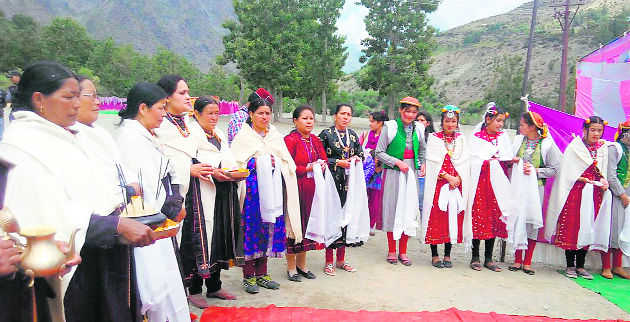
Tribal women dressed in traditional dresses during Sangam festival at Tandi in Lahaul -Spiti. Photo: Jai Kumar
Dipender Manta
While issues like triple talaq and instant divorce caught the nation’s attention, things are still unfair for women, especially those in tribal areas of Himachal Pradesh.
Women living in the tribal districts of Lahaul-Spiti, Kinnaur and a few parts of Chamba are deprived of their rights on ancestral property. They are still bound by the old patriarchal law that allows only men to inherit the property. They cannot inherit property in accordance with the Hindu Succession Act of 1956.
Even in this century, women in the remote and inaccessible terrain of the Himalayan state inherit only trouble instead of assets after the death of their parents and even husbands.
The plight of tribal women, which was hidden since long, has been highlighted in a short documentary film ‘No Woman’s Land’ directed by Dr Dev Kanya Thakur.
She took an initiative to raise the issue of tribal women through her short documentary film infront of the state and Central governments to do something to protect the rights of tribal women. It is a 52-minute documentary film based on the property rights of tribal women in Himachal Pradesh in India.
Talking to The Tribune, Film Director Dev Kanya Thakur said: “Today, we talk about women empowerment, women security and imbalance in child sex ratio. A large amount of money is spent on women programmes. But the law in one corner of India here is still gender biased. General law is not applicable here like other parts of the country. Patriarchal law prevails in tribal areas of Himachal. This is a revenue law according to which a woman cannot inherit the ancestral property both from paternal and maternal side.”
“Due to this law, women are suffering in tribal areas. I have written and directed the film. I found this subject appalling and though it should be raised at national and international platform, because no political party wants to discuss this subject. This film is a case study of those women, who are suffering because of this law and want to amend it which is gender biased,” she said.
This short film was produced in 2015 and Dev Kanya screened it at different platforms to bring out the issue in public domain. She suffered resistance from the male society of tribal districts, but did not turn back from her mission. As a result, the issue was picked up by local and national media, which brought the matter in cognizance of Himachal Pradesh High Court.
In June 2015, the Himachal Pradesh High Court had given a landmark judgment in one case of a tribal woman, which came as a big relief to women who had been denied the right to inherit ancestral property, particularly in tribal regions of Lahaul-Spiti and Kinnaur. But later, the verdict of the High Court was challenged in Supreme Court and now, the decision is pending.
The judgment had come in a case dating back to 1996. A Gaddi tribal Rasalu left his family entangled in a legal battle over the right to his property. His son Bahadur challenged the mutation of the land, registered in the name of all six siblings, claiming that in his tribe, property could be ‘given’ only on to sons and daughters had no legal right to the same. In the lower judiciary, Chamba’s senior sub-judge in 2002 went in favour of the appellant. This judgment was challenged and the case went all the way up to the high court, where Justice Rajiv Sharma gave a 60-page order allowing tribal women to inherit property.
The court held that tribal women are entitled to inherit property as the ‘Right to Equality’ was a constitutional right and shall prevail over statutory rights.
Shashi Kiran, a tribal woman and vice-president of Zila Parishad Lahaul-Spiti, said due to lack of property rights, women are a suffering lot. Male society is against giving property rights to women in tribal areas. Reason cited is the scarcity of fertile agricultural land. A belief is that giving inheritance rights to women will give an opportunity to outsiders to become the owners of the land if they marry outside the community.
She said: “There are many cases, where women, after the death of their husbands or parents, were abandoned by their family members, forcing them to eke out a miserable living. We are expecting justice from the apex court as the High Court has already favoured us.”
Screened in Greece this year
- ‘No Woman’s Land’ was screened during the 5th Peloponnisos International Documentary festival in Greece on January 25, 2019.
Awards won
Dev Kanya got recognition after the screening of this film and received several awards from different organisations. Thereafter, she produced a few more short films including ‘Laal Hota Drakhat’, ‘Behind the Bars’ and a few others on social issues. A short film ‘Behind the Bars’, produced and directed by Devkanya, won the first prize under the National Human Rights Commission (NHRC) Short Film contest in 2018.
- National Human Rights Commission award
- Laadli Media award in 2011 for writing on gender issues
- Laadli media award in 2018 for poem ‘Pahar ki aurat’
- Columnist of the year 2011 by Himachal This Week


























